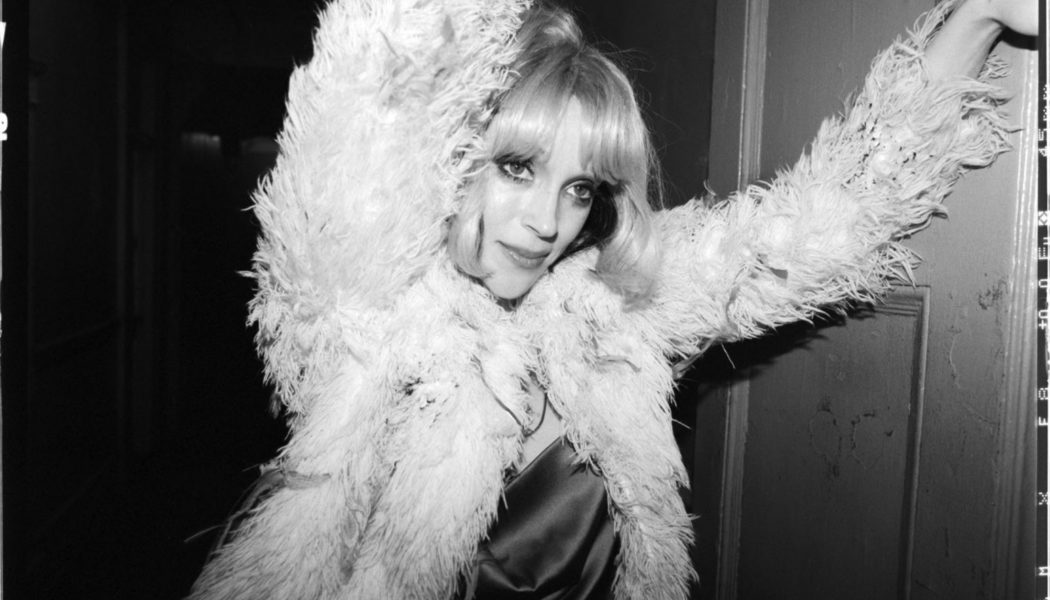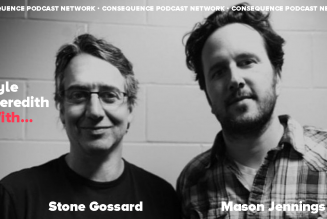
That sort of on-stage demeanor defined a tightly-packaged period of time in St. Vincent’s career — one that has been defined by and composed of highly-specific eras since signing with Loma Vista. There was the high-priestess-inspired glitchy and electric St. Vincent, a rollout for which the artist sported silvery-white spring-curls (the project won a Grammy for best alternative album), and the tongue-in-cheek Masseducation, her 2017 release full of double meaning and highbrow observations identified by its intense saturation and St. Vincent’s sleek dark bob (the 2018 piano-reworking pulled a 180 with softer-neutral tones). Now, there’s the jazzy, ‘70s-inspired Daddy’s Home (out this Friday, May 14), for which the artist born Annie Clark decided to don a blonde, bobbed wig cut with bangs.
The music is less suited for rowdy festival crowds and more so for patrons of a dim-lit venue in New York’s West Village (St. Vincent sighs with hope at the idea of playing a residency “in a sweaty little club”). It’s why, Farrell says, her first live performance of this album’s cycle — as musical guest on Saturday Night Live – couldn’t have been a more perfect setting. He says the last time St. Vincent performed on the show, “we basically made the stage look like her [self-titled] album artwork. For this one it was like, ‘We just want to make it look like Saturday Night Live.’” The team even tried to secure set props from 1975, the year the show debuted, though it proved more challenging than anticipated. Even still, he says, “[The stage] is so New York.”
Her performance of singles “Pay Your Way in Pain” and “The Melting of the Sun” — the latter of which St. Vincent delivered while seated in stockings and a feathered coat — introduced her latest look as “this kind of sleazy, downtown New York 1971-1975’s Candy Darling character,” according to Farrell. He points to the tradition of eras, from KISS to David Bowie to The Beatles, saying “I love how Annie taps into that genealogy of rock and roll. From the label’s perspective, it’s most exciting to watch an artist develop like she has.”
For the Daddy’s Home era, St. Vincent says she wanted to explore and tell the story of this period of time “where life was bad but the music was good, which kind of feels like now in some ways.” She started working with collaborator Jack Antonoff on the record in the winter of 2019, around the time her father was released from prison after nearly 10 years for his involvement in a stock-manipulation scheme. As a result, she found herself revisiting memories of her childhood, from vinyl her father had played to seeing the 1977 film Opening Night starring Gena Rowlands.
“It wasn’t like I went back and studied and rewatched it, it was just the feeling,” St. Vincent says. “Half the time I find the creative process is your impression of a memory of something that you loved, and then trying to get at that memory: ‘How do I capture this?’ And then, of course, ironically, every time we access a memory we’re changing it.”
It’s precisely why, she says, it’s important to remember that while she’s the authority on her story, it’s exactly that: hers. “I’m not the authority on anyone else’s,” she says. “We [all] live by the stories we tell ourselves, and we are constantly creating new stories to live by.”
In many ways, that’s the fun of being — and being adjacent to — St. Vincent, as those new stories evolve into miniature worlds time and time again. “I’ve been sitting here having a front row seat for a long time and am used to being blown away and surprised by what she comes up with for every single project,” says Farrell. “She’s everything a rockstar should be.”
St. Vincent says she plans to never stop throwing such change-ups. “I hope I go out like a jazz musician, I hope I just die on stage,” she says. “I don’t see an end to making things. I only want to get better.”
At the same time, she’s well aware that with longevity comes a sort of responsibility — and it’s one she doesn’t take lightly. “I think [there’s] a tacit agreement from artist to fan,” she says. “I will never make you feel stupid for loving me.”
Perhaps St. Vincent’s most important character of all, though — the one that, by design, fans likely know least — is the role of Annie Clark, a 38-year-old from Tulsa, Oklahoma. While in lockdown last year due to the pandemic, she says it was the first time in her adult life that she was in one place for more than two weeks. When asked if she got to know herself any better, she recalled a quote from Veep, which she had rewatched while stuck at home: “[It’s] reminding me of Selina Meyer doing an interview after she loses the presidency and she’s like, ‘I just got to know a little lady named Selina, and I like her.’”










